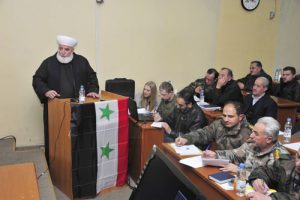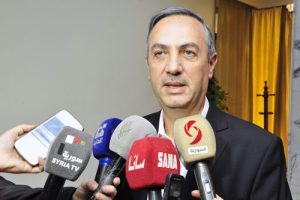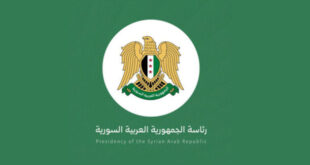Damascus Countryside, SANA – A meeting was held on Sunday to discuss and preview the results of the work of the reconciliation committees in a number of villages and towns in the Eastern Ghouta of Damascus.
Damascus Countryside Governor Alaa Munir Ibrahim, representatives of local reconciliation committees, social and religious figures, Head of the Hmeimim-based Russian Coordination Center for Reconciliation and Head of the National Operational Group Haitham Imran participated in the meeting which was held at the building of Damascus Countryside Governorate.
Members of the reconciliation committees affirmed that most of the locals in Eastern Ghouta want reconciliations to be achieved whereas the terrorist groups that are affiliated to Jabhat al-Nusra and some people who are taking advantage of the continuous chaos in Eastern Ghouta have been rejecting the reconciliation, trying to hinder it and exerting pressure on the locals to refuse the settlement.
The participants in the meeting stressed on the role of religious figures in the reconciliation operations and the importance of seizing the opportunity and taking advantage of the Amnesty Decree NO.15 for 2016, which will end on January 27th, and exert pressure on all parties to accept the reconciliation and put an end to the presence of arms and gunmen in the region.
For his part, Damascus Countryside Governor affirmed that a reconciliation and settlement agreement will take place in one of the areas of Eastern Ghouta or more within the next few days, adding that an expanded negotiation committee has been formed of representatives from all areas to communicate with the locals and militants in Eastern Ghouta.
He affirmed that the reconciliation process will continue in Damascus Countryside, noting that the reconciliation in Wadi Barada is almost completed and the area will be totally secured in the upcoming days where the foreigner militants will be evacuated to Idleb.
He added that around 1500 people have had their legal status settled.
M. al-Frieh/H. Said
 Syrian Arab News Agency S A N A
Syrian Arab News Agency S A N A




